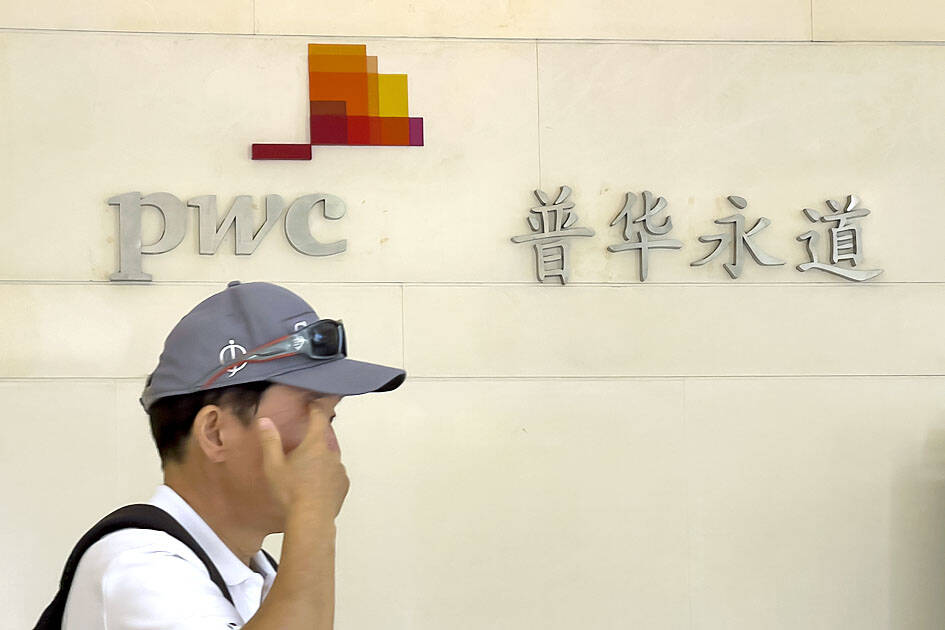Chinese authorities have banned the accounting firm PricewaterhouseCoopers LLP for six months and fined it more than 400 million yuan (US$56.5 million) over its involvement in the audit of collapsed property developer China Evergrande Group (恆大集團).
The punishment is the heaviest yet for international accounting firms operating in China.
PwC would be banned from signing off on any financial results in the country for six months. Already, it has been losing clients.

Photo: AP
The Chinese Ministry of Finance in a statement on Friday said that it was imposing 116 million yuan in fines and confiscation of illegal gains on PwC Zhong Tian LLP (普華永道中天會計師事務所), also known as PwC China, as well as a six-month business suspension, revocation of PwC’s Guangzhou branch and an administrative warning.
A separate regulator, the China Securities Regulatory Commission, also imposed fines and confiscations totaling 325 million yuan on PwC for allegedly failing to perform due diligence in the audit of Evergrande.
The Chinese Ministry of Finance said PwC issued “false audit reports” of Evergrande and that the audit procedures had “serious defects” in design and implementation, leading to many false conclusions.
It also said that PwC did not maintain “professional skepticism” and failed to point out errors and a lack of information disclosure by Evergrande during the audits.
The securities regulator said 88 percent of the records kept by PwC regarding the real estate projects were inconsistent with the actual implementation and were “seriously unreliable.”
When on-site investigations were carried out, some projects were still “a piece of vacant land” despite being considered to have met the delivery conditions, the regulator said.
“The work performed by PwC Zhong Tian’s Hengda audit team fell well below our high expectations and was completely unacceptable,” PwC global chair Mohamed Kande said in a statement. Hengda Real Estate Group Co (恒大地產集團) is the principal subsidiary of China Evergrande Group.
“It is not representative of what we stand for as a network and there is no room for this at PwC,” he said.
The statement said PwC Zhong Tian has cooperated fully with regulators, respects their decisions and would fully comply with the administrative penalties.
The firm is also in the process of issuing financial penalties for current and former firm leaders who were responsible for the business, the statement said.
PwC came under Beijing’s scrutiny after the collapse of Evergrande in January, the world’s most indebted developer and a symbol of China’s ongoing property crisis.
China’s securities regulator in March said that Evergrande had inflated its China revenues by almost US$80 billion in 2019 and 2020.
In May, authorities fined the company US$577 million.
PwC had audited Evergrande’s accounts for 14 years until last year and gave it a clean bill of health.

When an apartment comes up for rent in Germany’s big cities, hundreds of prospective tenants often queue down the street to view it, but the acute shortage of affordable housing is getting scant attention ahead of today’s snap general election. “Housing is one of the main problems for people, but nobody talks about it, nobody takes it seriously,” said Andreas Ibel, president of Build Europe, an association representing housing developers. Migration and the sluggish economy top the list of voters’ concerns, but analysts say housing policy fails to break through as returns on investment take time to register, making the

‘SILVER LINING’: Although the news caused TSMC to fall on the local market, an analyst said that as tariffs are not set to go into effect until April, there is still time for negotiations US President Donald Trump on Tuesday said that he would likely impose tariffs on semiconductor, automobile and pharmaceutical imports of about 25 percent, with an announcement coming as soon as April 2 in a move that would represent a dramatic widening of the US leader’s trade war. “I probably will tell you that on April 2, but it’ll be in the neighborhood of 25 percent,” Trump told reporters at his Mar-a-Lago club when asked about his plan for auto tariffs. Asked about similar levies on pharmaceutical drugs and semiconductors, the president said that “it’ll be 25 percent and higher, and it’ll

CHIP BOOM: Revenue for the semiconductor industry is set to reach US$1 trillion by 2032, opening up opportunities for the chip pacakging and testing company, it said ASE Technology Holding Co (日月光投控), the world’s largest provider of outsourced semiconductor assembly and test (OSAT) services, yesterday launched a new advanced manufacturing facility in Penang, Malaysia, aiming to meet growing demand for emerging technologies such as generative artificial intelligence (AI) applications. The US$300 million facility is a critical step in expanding ASE’s global footprint, offering an alternative for customers from the US, Europe, Japan, South Korea and China to assemble and test chips outside of Taiwan amid efforts to diversify supply chains. The plant, the company’s fifth in Malaysia, is part of a strategic expansion plan that would more than triple

Taiwanese artificial intelligence (AI) server makers are expected to make major investments in Texas in May after US President Donald Trump’s first 100 days in office and amid his rising tariff threats, Taiwan Electrical and Electronic Manufacturers’ Association (TEEMA, 台灣電子電機公會) chairman Richard Lee (李詩欽) said yesterday. The association led a delegation of seven AI server manufacturers to Washington, as well as the US states of California, Texas and New Mexico, to discuss land and tax issues, as Taiwanese firms speed up their production plans in the US with many of them seeing Texas as their top option for investment, Lee said. The